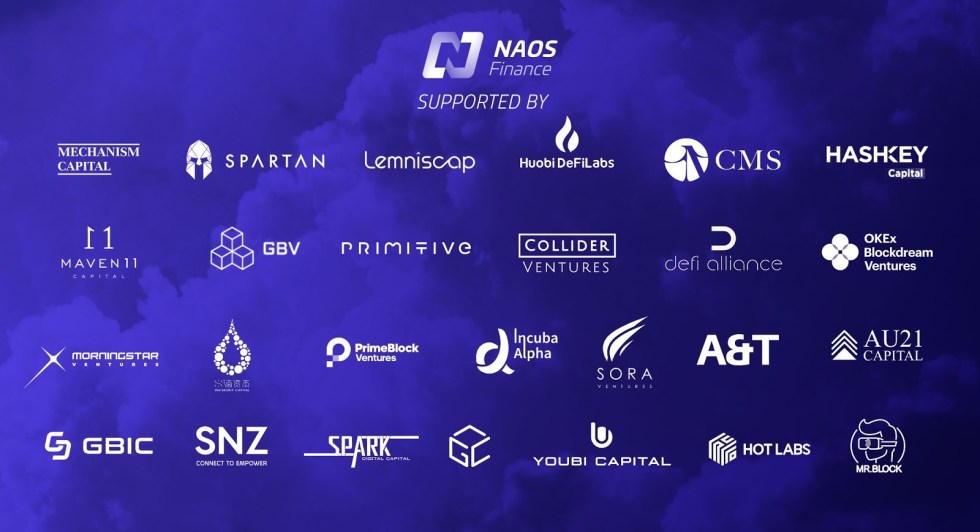NAOS Finance, one of the most exciting DeFi projects in 2021, recently announced that they successfully closed a private funding round, through which they raised $5.1 M from strategic investors. This success is an indication of investor confidence in the project as only a few projects have managed to raise such a huge amount.
The funding round was spearheaded by different investor groups including The Spartan Group, Lemniscap, CMS, Huobi DeFi Labs, Hashkey, Maven 11, Genesis Block Ventures, Incuba Alpha, DeFi Alliance, ColliderVentures, OKex Blockdream Ventures, Morningstar Ventures, Primitive Ventures, GenBlock, AU21 Capital, Hash Global, Hot Labs and angel investors Richard Ma (CEO of Quantstamp) and Xinjun Liang (Co-Founder of Fosun Group).
The funding will go a long way in achieving the mission of NAOS Finance of building a real-world asset-based infrastructure for the DeFi ecosystem to innovate on. NAOS Finance is therefore focused on solving the current issues in financial institutions, most of which are caused by government restrictions.
Current challenges affecting financial institutions
Lending and taking deposits have existed for hundreds of years. There are thousands of financial institutions that take care of these practices such as banks. However, these institutions are burdened by numerous challenges such as the lending terms imposed on users. For instance, SMEs have shorter operating histories and insufficient collateral to secure business loans from banks. Therefore, they may fail to extend quality services to their customers, hence, their growth is restrained.
Due to the challenges attached to accessing lending from big financial corporations, many FinTech lending companies came into existence to simply fulfil the needs these financial institutions neglected. As a result, they enabled financial inclusion and bridged the credit gap by billions of dollars.
However, with the popularity of these alternative lending companies, governments quickly imposed restrictions as knee-jerk reactions to regulatory insights. As a result, the FinTech companies that were formed to help customers have become a spitting image of the traditional banking system they were trying to replace.
Certain regulations affect the growth of the FinTech companies and restrain their investment circle. For instance, the new regulation in Indonesia requires FinTech companies to secure foreign investment only from investors operating in the financial services industry. This leaves a company with few options as the number of investors is dramatically reduced
The government constraints hinder the development of new industries by limiting the amount of available credit that SMEs can receive. This is further widening the credit gap across the globe, showing the need for a more open and permissionless financial system.
NAOS Finance is redefining DeFi
NAOS Finance is an interoperable marketplace for loans backed by offline income streams. The platform facilitates DeFi lenders and SME borrowers to allow both parties to interact in a permissionless manner on the blockchain. Through NAOS Finance, lenders have stable and recurring income streams while the on-chain world is connected with more off-chain opportunities.
NAOS Finance is on a mission of bridging the multi-trillion-dollar global credit gap by allowing lenders and borrowers to interact on its platform. The protocol built on the Ethereum blockchain and Interplanetary File System (IPFS) automates the tokenization of real-world assets and the end-to-end lending process.
NAOS Finance is creating a platform that will offer the best interest rate on any comparable loan of the same risk profile and terms while serving users from any part of the world in a borderless fashion. The platform hopes to transfer financial value in form of interest spreads and service fees from financial institutions to lenders and borrowers. NAOS Finance will also democratize irrefutable and immutable loan performance data held closely by centralized institutions as well as transfer custodial ownership of accounts from financial institutions to individuals.
NAOS Finance to transform lending and borrowing
The current financial industry will be disrupted soon, ushering in a new world of frictionless finance where global supply and demand of capital and assets are managed in perfect equilibrium. Here, capital and assets are exchanged seamlessly on-chain and off-chain. This is the world that NAOS Finance strives to create. The platform is seeking to unlock the possibilities of further DeFi innovations by bringing real-world assets on-chain as well as eliminate the inefficiencies of traditional finance by decentralizing decision making.
On this platform, users can instantaneously assess the risk of assets while lenders with the understanding of the risk or profit profile will fulfill the capital requirements. The lenders on the platform will have access to comprehensive analytical tools as well as complete sets of verifiable on-chain data to help them make informed decisions.
Smart contracts will be used to automate the entire funding and settlement process, to fully emulate the existing banking services without incurring additional costs or being overcollateralized.
Moving Forward
NAOS Finance seeks to create a platform that is fully inclusive, allowing lenders and borrowers a decentralized solution with unbeatable terms and interest rates. Through NAOS Finance, the growing global credit gap can be tackled, as centralized government rules that have crippled the traditional sector can not apply to the platform. As such, services that have been formerly offered by FinTech companies can be offered here, on a grander scale. The asset base of NAOS Finance differentiates the protocol and will allow it to create more interesting DeFi applications. The recent successful funding round will enable NAOS Finance to build its vision of a real-world asset-based infrastructure for the DeFi ecosystem.
Disclaimer: The information presented here does not constitute investment advice or an offer to invest. The statements, views, and opinions expressed in this article are solely those of the author/company and do not represent those of Bitcoinist. We strongly advise our readers to DYOR before investing in any cryptocurrency, blockchain project, or ICO, particularly those that guarantee profits. Furthermore, Bitcoinist does not guarantee or imply that the cryptocurrencies or projects published are legal in any specific reader’s location. It is the reader’s responsibility to know the laws regarding cryptocurrencies and ICOs in his or her country.
